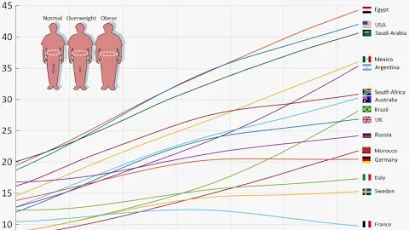Worldwide adult obesity has more than doubled since 1990, and adolescent obesity has quadrupled. In 2022, 890 million were living with obesity. That is 1 of every 8 people on the planet. Previous estimates by the World Obesity Federation suggested that there would be 1 billion people living with obesity by 2030, but we surpassed that number in 2024. More than half of the global population—51%, or over 4 billion people—will be obese (not overweight, obese) by 2035, and the condition will touch all regions and continents of the world. The new projection marks a sharp jump from current numbers.
The total cost of treating illnesses related to obesity will be an
estimated $4 trillion per year, which is about how much the COVID-19
pandemic cost the world in health care expenses in 2020. Meanwhile, the total U.S. weight loss product market grew to a historic $90 billion annually (2023 data),
boosted by soaring sales of popular (and very expensive) prescription weight loss drugs. And yet we are fatter than ever. So fat, in fact, that instead of dealing with it, the US seems to be shifting its focus to accepting and living with it.
A quick glance at the graphic above shows that this truly is a global problem, impacting countries large and small. Thanks to Egypt, the USA is not the fattest country on the planet but we can take scant comfort in being #2.
A close look, however, reveals an interesting discrepancy. Of the 15 countries shown in the chart, only two do not show an ever increasing rate of obesity among their citizens. In Germany the obesity rate has leveled off, while in France is is actually decreasing.
How have these two countries managed to rein in the soaring rate of obesity? It turns out to be no mystery: by eating less and being more active on a daily basis. They didn't need $900 a month drugs or supplements or special diets or coaches or gym memberships to do it.
The French government introduced its National Nutrition Health Program in 2001, targeting schools, the food industry, restaurants and researchers, setting national standards, providing financial and educational support and tools and programs. It seems to be working.
In Germany, the flattening of the obesity rate seems due to changing eating habits, with younger generations consciously choosing a lighter, healthier diet over traditional German fare.
So with government intervention or without it, it seems to have come down to what we all knew all along. We eat too much of the wrong things and spend too much time sitting.
What are you going to do?








